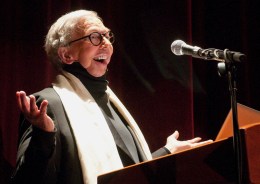
In this April 27, 2011 file photo, film critic Roger Ebert welcomes people to the opening of the 13th annual Ebertfest film festival on the University of Illinois campus in Champaign.
Legendary movie critic Roger Ebert, who died Thursday at the age of 70, was a dream journalist — and that’s from one man who had the prerogative to critique his work: Ebert’s onetime editor, Steven S. Duke, now an associate professor at the Medill School of Journalism at Northwestern University, had the privilege of working as Ebert’s editor at the Chicago Sun-Times, the newspaper that has published the critic’s movie reviews since 1967. Duke served as the newspaper’s features editor for five years and worked with Ebert at the publication for a dozen years in total. Here, Duke reflects on the good-humored, lightning-sharp Ebert, always quick with a joke and quicker with his writing.
Roger was the fastest writer I ever worked with. He would sit down at a — well, when we started — at a typewriter and write a review at typing speed without revisions, and it needed little or no editing. And the way he was able to do that — he viewed movies at the screening room at the Chicago Theatre, which was about a four- or five-block walk from the Chicago Sun-Times building at the time. After viewing the movie he would walk back to the office and he would enter on the newsroom side at the farthest end of the building and slowly work his way through, stopping at the desks of reporters and city editors and copy editors, chatting and telling bawdy jokes. He had the biggest collection of bawdy jokes of anybody I ever met. After his meander, he would sit down at his desk in his corner office and write. But what he didn’t let on was that he was writing the review in his head the entire time he was chatting and telling these jokes, so that when he came to sit down, it was done.
I remember once he was in Hollywood for his annual visit, when a major actress had died. I called him and said, “I’m not pushing you to do the obituary. But I wanted to give you the courtesy in case you wanted to.” And his response was, “I don’t have any of my references or books with me here. But sure.” So I said, “O.K., let me get somebody to dictate.” And he said, “No, I want you to do it.” And he rattled off the top of his head with citations of movies and dates and places he had interviewed her without any references and without any of it being wrong. It was a perfectly formed obituary. He was just an incredible writer.
He also was — for those who remember him from television in that cushy theater with Gene Siskel or Richard Roeper — in person exactly the man that you see or read about. He was warm, gracious, embracing, funny, generous. There was nothing false about him. He was also, despite the bulk of his income coming from television at the point that I was working with him — he called himself a newspaperman. That was his identity. He never viewed himself as a star, never viewed himself as a television performer. He was very much a proletarian newspaperman and a proud member of the working press fraternity.
Ebert was certainly a friend to all, but he was also markedly blunt. And that attitude carried over into a frankness about himself — he never hid anything. I was sitting on the copy desk one day and I got a phone call from Roger and he said, “Steve, I’m an alcoholic.” And I said, “You don’t need to tell me that, Roger.” And he said, “Yes, I do. Because I’ve made your life hard, I’ve made other people’s lives hard and I need to apologize. And I need you to call me on it if you see me slipping back into drinking again.” At this point he’d been going through the AA program, and part of the recovery is to tell people — that’s exactly what he was doing. And frankly, up to that point, I was not aware. I never saw it affect his work. I had been editing his copy for a long time at that point and did not realize that he had a drinking problem. But he was forthright about it and about everything else.
I’ll miss Roger’s mind the most. He had the most active, far-reaching mind that I have ever encountered. He really was a Renaissance man. He’s known for his movie reviews, but he was far, far more than that. He was the first person I knew to advocate for computer technology long before it was ever in the newsroom. He’d gone out and bought himself a computer. He dragged our newsroom kicking and screaming into that age. He wanted to file stories from the Cannes Film Festival and elsewhere electronically long before we were ever set up for it and insisted that we get an AOL account so that he could e-mail us stories. He’d learned computer technology, he was an advocate for it and his mind went — you know history, mathematics, music, you name it — he was interested and knowledgeable about it.
He was a celebrity in the journalism and film world, but he never pulled the star act. He was quite amenable to editing. If you needed or wanted to make a change, he was fine with that. He just rarely needed it. The prose just flowed. He was a real wordsmith.
— As told to Courtney Subramanian

